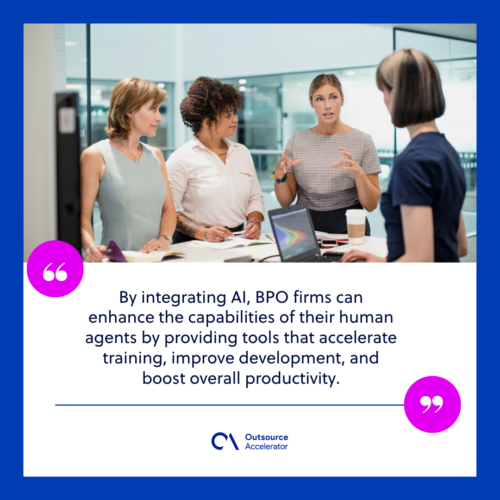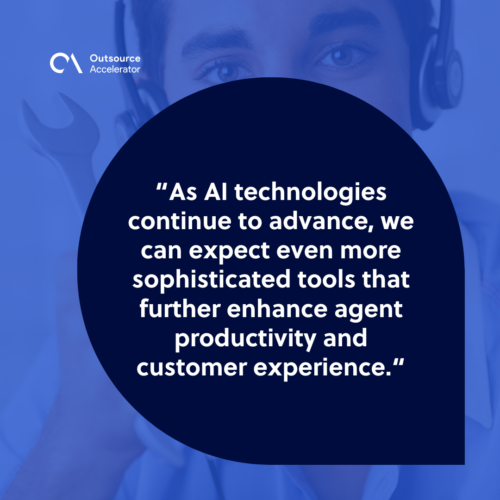The rise of AI-powered agents in the call center industry

In the fast-evolving customer service landscape, AI-powered agents are transforming the way call centers operate. By integrating advanced AI tools, call center agents are now able to work more efficiently and provide a much-improved customer experience.
This fusion of human expertise and artificial intelligence is not only enhancing productivity but also reshaping the future of customer service.
What are AI-powered agents?
AI-powered agents refer to call center agents who utilize AI tools and technologies to perform their tasks more effectively. These tools can include chatbots, speech recognition software, predictive analytics, natural language processing (NLP), and machine learning algorithms.
The primary objective is to support human agents in delivering faster, more accurate, and more personalized customer service.
In the 500th episode of the Outsource Accelerator (OA) Podcast, OA Founder and CEO Derek Gallimore discussed this topic with Megan Bassler, the VP of Strategic Partnerships at OP360.
AI-powered agents: Enhancing human capabilities
By integrating AI, BPO firms can enhance the capabilities of their human agents by providing tools that accelerate training, improve development, and boost overall productivity.
Megan emphasized, “It’s really just giving [call center agents] all the tools they need to be even more dangerous and to make their job as easy as possible.”

It looks like AI will become more significant in the industry as the years go by. In fact, Megan noted that most clients now inquire about the AI technologies being utilized during initial exploratory conversations.
“I think in order to stay relevant in the space, we need to truly utilize and leverage AI partner with AI companies, which is what we’re doing today,” Megan stated.
AI’s ability to handle tier one and tier two support allows human agents to focus on more nuanced and complex customer service issues. This division of labor ensures that agents can leverage their expertise where it is most needed, while AI handles repetitive and straightforward tasks.
The Strategic Partnerships VP reiterated, “We’re not using AI to replace our agents; we’re using AI to power our agents…
We believe that as AI can transform some of the less complex work, our teams will be required to perform the more complex and nuanced work types, which we absolutely welcome.”
Benefits of AI integration
AI technologies are revolutionizing the call center landscape since they help handle a wider range of tasks.
The key benefits of AI integration in the BPO industry include:
- Efficiency. AI can process information and respond to customer queries faster than human agents. This reduces wait times and ensures that customers receive prompt assistance.
- Consistency. AI tools provide standardized responses, ensuring consistent service quality across all interactions. This builds trust and reliability among customers.
- Data analysis. AI can analyze vast amounts of data to identify patterns and trends, enabling call centers to predict customer needs and improve service strategies.
Embracing AI while maintaining a human touch
Call centers must find the right balance between AI and human interaction to harness the benefits. The key is to invest in AI-powered agents.
However, this may bring a false impression that AI will take over call center operations. As for OP360, Megan clarified, “We’re not using AI to replace our agents. We’re using AI to really power our agents.
While AI is vital to the process, she expressed confidence in the continued importance of human interaction.
“We believe that as AI can transform some of the less complex work, our teams will be required to really perform the more complex and nuanced work types, which we absolutely welcome.”
By combining advanced technology with skilled human resources, OP360 can deliver superior service and meet its clients’ evolving needs.
The Future of AI in BPO
The integration of AI in call centers is still in its early stages, but you can’t deny its vast potential.
As AI technologies continue to advance, we can expect even more sophisticated tools that further enhance agent productivity and customer experience.

Conversely, AI lacks the emotional intelligence, empathy, and nuanced understanding that human agents bring to customer interactions.
Megan remains optimistic that the demand for human agents will persist, as clients recognize the value of the human touch in providing exceptional customer service.
“Data doesn’t have the emotions, the feelings, the indicators. [By] having that level of human interaction to provide that layer of soft logic, emotional intelligence, empathy, we’re very confident that clients are going to see the necessary need for that with their customer interactions,” she affirmed.
The synergy between human expertise and AI technology is driving the future of customer service.
As AI continues to evolve, its integration into call centers will undoubtedly unlock new levels of productivity and customer satisfaction, setting a new standard for excellence in the industry.






 Independent
Independent




